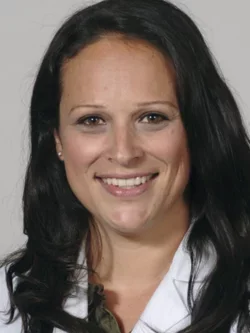What Is a Gynecologist?
Faculty Spotlight

A Day in the Life of Dr. Jacqueline Fahey, Gynecologist and Obstetrician at UCLA Health
Jacqueline N. Fahey, MD, says the most fulfilling aspect of being a gynecologist and obstetrician (ob/gyn) is caring for women throughout their lives.
“You build lasting relationships with patients, seeing some of them from their first periods until they go through menopause,” she says. “You help them through many different phases and changes in their lives.”
For example, Dr. Fahey may help a patient become pregnant, take care of them during pregnancy, deliver their baby, provide postpartum care, and conduct their annual exams for many years after delivery.

She often treats patients in the same family, practically becoming a family member herself.
“It’s very rewarding to do that. They send me holiday cards, and I love seeing multiple patients—grandmothers, mothers, daughters—all in the same photo.”
In a typical week, Dr. Fahey splits her time between seeing patients in the office for routine and preventative care, delivering babies, providing postpartum care, seeing pregnant women who are admitted to the hospital, and performing gynecologic surgery.
Obstetrician vs Gynecologist - What’s the Difference?
Obstetricians and gynecologists both focus on female reproductive health, but they see patients with different needs.
What Does an Obstetrician Do?
Obstetricians provide care for patients who are pregnant or who recently gave birth.
Example obstetrician services:
- Conducting prenatal screenings
- Delivering babies
- Conducting ultrasounds
- Consulting on infertility or miscarriage
What Does a Gynecologist Do?
Gynecologists provide primary and preventative care for patients who are not pregnant.
Example gynecologist services:
- Screening for cervical, ovarian, uterine/endometrial, and vaginal cancers
- Removing fibroids
- Treating urinary tract infections (UTIs), sexually transmitted infections (STIs), and yeast infections
- Diagnosing and treating ovarian cysts and polycystic ovarian syndrome (PCOS)
What Is an OBGYN?
Generalist ob/gyns, like Dr. Fahey, take care of both pregnant women and non-pregnant women throughout their reproductive lives, not just when they’re having babies.
“It’s a common misconception that we only deliver babies,” Dr. Fahey says. “Our work is very dynamic. We provide different types of care in the office and the hospital—everything from routine care to surgery.”
When Do Gynecologist See Patients
Dr. Fahey says patients should see a gynecologist for their annual check-up, when they want to discuss contraception, or if they’re experiencing any vaginal, urinary, or breast symptoms, changes or abnormalities, including painful periods, vaginal discharge, and breast pain or lumps.
“If a patient has a family history of cancers, it's important to seek care early.”

How to Become a Gynecologist
To become a gynecologist, you must complete medical school, residency training in both obstetrics and gynecology, and additional training in fellowship programs.
All aspiring gynecologists must complete the same training requirements, but their individual career and education paths may vary significantly.
Dr. Fahey says her own path deviated from the norm.
“I had no idea I wanted to be an ob/gyn. I just knew I wanted to take care of patients, conduct research, and work in academic medicine, so I decided to get some hands-on experience before medical school,” she says, explaining that she participated in Teach for America before becoming a research associate at UCLA.
When she started medical school, she still had no idea she wanted to be an ob/gyn. That idea sparked during clinical rotations.
“It was like this door opened, and I was in a world I didn't even know existed where we got to take care of women throughout their lives and see people starting families and bringing babies into the world.”
Ob/gyn care appealed to her emotions, and the practice’s specifics appealed to her intellect. She found the variety it offered stimulating, especially the idea of combining medicine and surgery.
Dr. Fahey advises hopeful ob/gyns to start exploring learning opportunities as soon as possible.
“If it’s something you think you might be interested in, seek out opportunities early in your medical career, such as shadowing someone during a delivery or in the office.”
Getting early hands-on experience, she says, helps medical students see what it’s really like to be an ob/gyn and decide if it’s a good fit.
Women’s Health Week
In honor of Women’s Health Week, Dr. Fahey wants women to remember their reproductive health is complex and dynamic.
“Ob/gyns specialize in those complexities and changes. Finding a doctor you trust to help you through everything, whether you’re 16 or 26 or 56, will make you feel more comfortable throughout life’s changes.”
She urges women, even those who don’t have any known medical problems, to see their ob/gyn each year.
“It’s extremely important to have that opportunity to talk about what’s happening, because even symptoms that seem normal could be a sign of a treatable abnormality,” she says, underscoring that patients should feel free to bring up any symptoms bothering them. Otherwise, they may never know what treatment options might improve their quality of life.
“Women don’t necessarily have to suffer through painful periods just because they’ve always been that way. I see women all the time who have endometriosis or urinary incontinence and have just been suffering through it because they’d had a baby and thought it was normal,” she says.
“Women don’t have to live with that.”
FAQ for Future Gynecologists
How Much Does a Gynecologist Make?
According to the United States Bureau of Labor Statistics, the average annual obstetrician and gynecologist salary in the U.S. is $277,320
What Characteristics Make Someone a Good OBGYN?
Adaptability. Ob/gyns often work under pressure to provide unplanned and/or unscheduled care, such as delivering babies.
Listening ability. Ob/gyns should build trust with patients, carefully listening to their symptoms, family histories, and concerns.
Communication skills. Ob/gyns have a responsibility to educate their patients, ensuring they understand what’s going on with their bodies and, when necessary, what treatment options they have.
What’s Most Challenging About Being an OBGYN?
“The variety that’s so exciting in this field may also make you feel pulled in many directions,” Dr. Fahey says. “There’s also no predictable schedule because of the kind of care we provide. Babies are born any time of day on any day of the week.”
Are There Any Subspecialties Within the Field of Gynecology?
Aspiring gynecologists have a range of options for specializing if they choose to. Subspecialties include:
- Maternal fetal medicine (MFM)
- Gynecologic oncology
- Complex family planning
- Urogynecology
- Reproductive endocrinology
- Pelvic medicine



